The Scrum Master plays a central role in facilitating project success in agile environments. They ensure that the team adheres to agile practices and principles, fostering a collaborative and efficient project management process.
Key skills for a Scrum Master include a strong understanding of Scrum and Agile methodologies, excellent communication and facilitation abilities, and the capacity to handle team dynamics and resolve conflicts.
Candidates can write these abilities in their resumes, but you can’t verify them without on-the-job Scrum Master skill tests.
In this post, we will explore 9 essential Scrum Master skills, 11 secondary skills and how to assess them so you can make informed hiring decisions.
Table of contents
9 fundamental Scrum Master skills and traits
The best skills for Scrum Masters include Facilitation, Agile Methodologies, Scrum Framework, Conflict Resolution, Coaching, Communication, Problem Solving, Servant Leadership and Time Management.
Let’s dive into the details by examining the 9 essential skills of a Scrum Master.
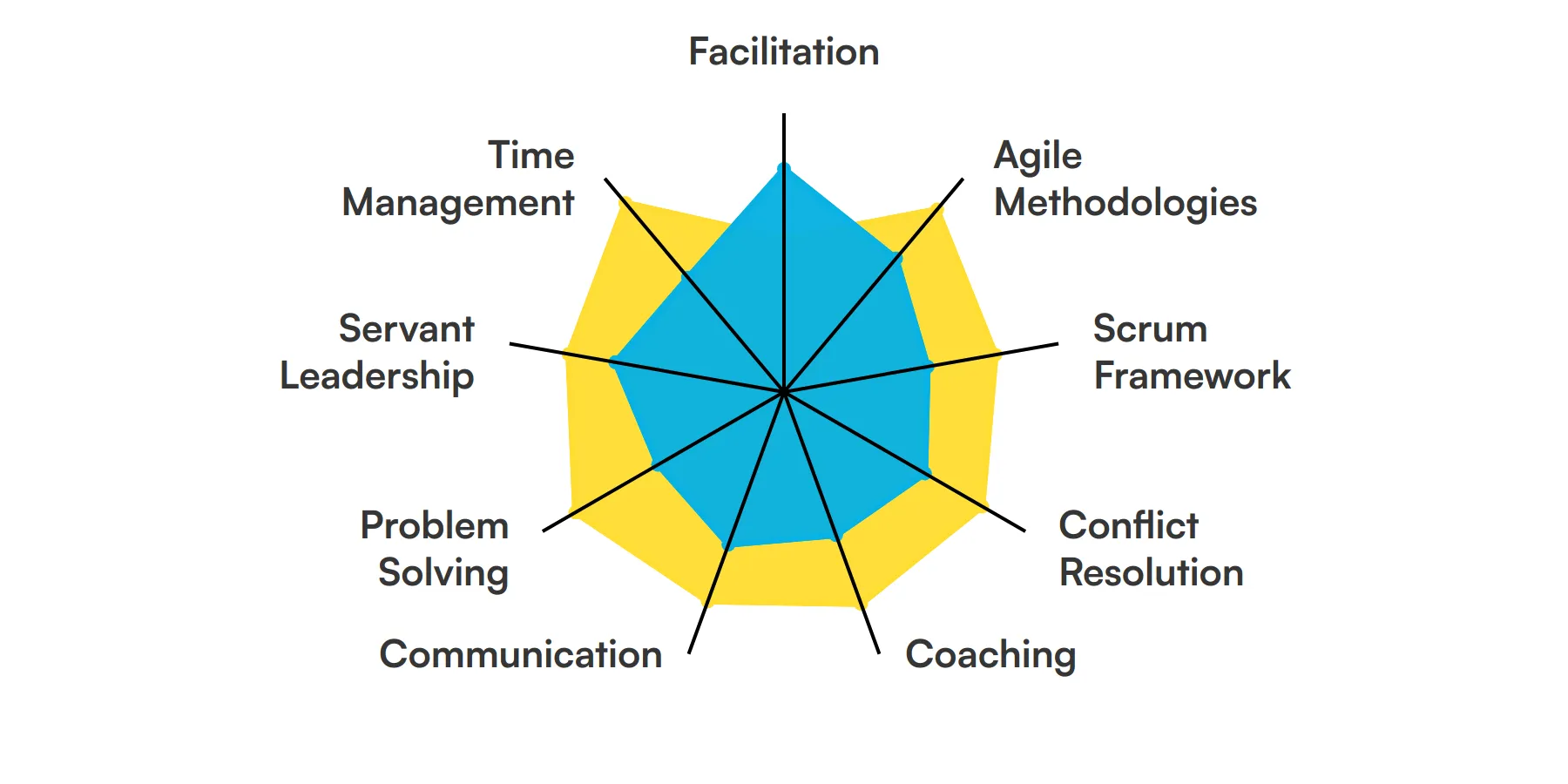
Facilitation
A Scrum Master needs to guide team meetings and ensure productive discussions. This skill helps in keeping the team focused on their goals and resolving any conflicts that arise during the sprint.
Check out our guide for a comprehensive list of interview questions.
Agile Methodologies
Understanding Agile principles is fundamental for a Scrum Master. This knowledge helps in implementing Scrum practices effectively and ensuring the team adheres to Agile values.
Scrum Framework
A deep understanding of the Scrum framework is necessary. This includes knowing the roles, events, and artifacts of Scrum, which helps in guiding the team through the Scrum process.
For more insights, check out our guide to writing a Scrum Master Job Description.
Conflict Resolution
Scrum Masters often need to mediate disputes within the team. This skill is crucial for maintaining a harmonious work environment and ensuring that conflicts do not derail the project.
Coaching
A Scrum Master should be able to coach team members on Agile practices and principles. This helps in building a self-organizing team that can manage its own work effectively.
Communication
Clear and effective communication is key for a Scrum Master. This skill ensures that all team members are on the same page and that stakeholders are kept informed about the project's progress.
Problem Solving
Scrum Masters need to identify and address issues that may impede the team's progress. This skill helps in finding solutions quickly and keeping the project on track.
Servant Leadership
A Scrum Master should lead by serving the team. This approach helps in empowering team members and fostering a collaborative work environment.
Time Management
Managing time effectively is crucial for a Scrum Master. This skill ensures that sprints are completed on schedule and that the team remains productive.
11 secondary Scrum Master skills and traits
The best skills for Scrum Masters include Technical Knowledge, Risk Management, Adaptability, Empathy, Negotiation, Analytical Thinking, Mentoring, Stakeholder Management, Emotional Intelligence, Decision Making and Continuous Improvement.
Let’s dive into the details by examining the 11 secondary skills of a Scrum Master.
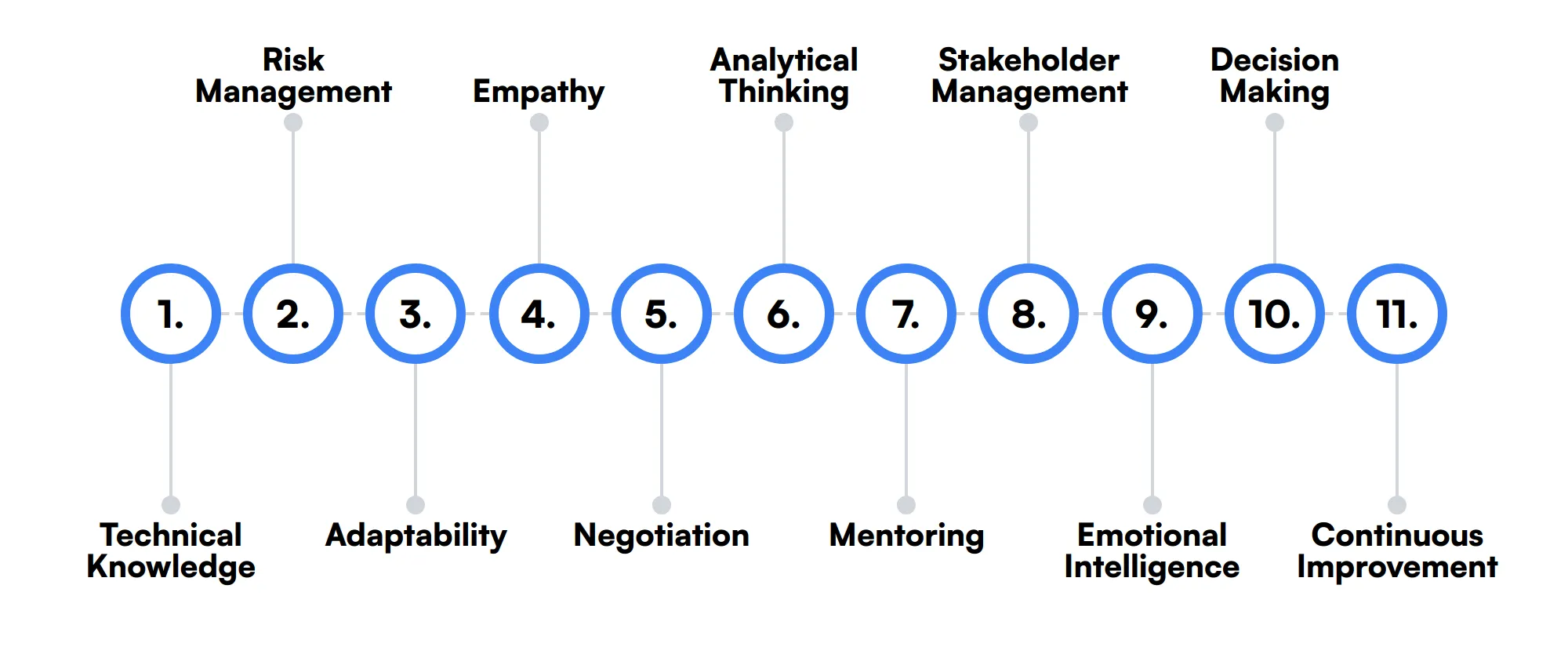
Technical Knowledge
While not mandatory, having a technical background can help a Scrum Master understand the challenges faced by the development team and provide better support.
Risk Management
Identifying potential risks and developing mitigation strategies is important. This skill helps in preventing issues that could impact the project's success.
Adaptability
Being able to adapt to changing circumstances is valuable. This skill helps a Scrum Master respond effectively to unexpected challenges and changes in project scope.
Empathy
Understanding the perspectives and feelings of team members can improve team dynamics. This skill helps in building trust and fostering a positive work environment.
Negotiation
Scrum Masters may need to negotiate with stakeholders and team members. This skill helps in reaching agreements that are beneficial for the project.
Analytical Thinking
Being able to analyze data and metrics is useful for a Scrum Master. This skill helps in making informed decisions and improving team performance.
Mentoring
Providing guidance and support to less experienced team members can be beneficial. This skill helps in developing the team's capabilities and fostering a culture of continuous improvement.
Stakeholder Management
Managing relationships with stakeholders is important. This skill helps in ensuring that their expectations are met and that they are kept informed about the project's progress.
Emotional Intelligence
Understanding and managing one's own emotions, as well as those of others, can improve team interactions. This skill helps in creating a supportive and productive work environment.
Decision Making
Making timely and effective decisions is crucial. This skill helps a Scrum Master guide the team through challenges and keep the project moving forward.
Continuous Improvement
Encouraging a culture of continuous improvement is beneficial. This skill helps in identifying areas for improvement and implementing changes that enhance team performance.
How to assess Scrum Master skills and traits
Assessing the skills and traits of a Scrum Master is a nuanced process that goes beyond just checking off a list of qualifications. A Scrum Master's effectiveness is often reflected in their ability to navigate complex team dynamics and drive project success through the Scrum framework.
While resumes and interviews can provide an overview of a candidate's background, they fall short in demonstrating how well a person can actually apply Scrum principles in real-world scenarios. This is where practical assessments come into play, offering a deeper insight into a candidate's capabilities in facilitation, agile methodologies, conflict resolution, coaching, communication, problem solving, servant leadership, and time management.
To streamline the evaluation process and ensure you're selecting the top talent, consider incorporating Adaface assessments into your hiring strategy. These assessments are designed to mirror real-life challenges that Scrum Masters face, helping you identify candidates who are not only knowledgeable but also highly effective in applying their skills.
Let’s look at how to assess Scrum Master skills with these 4 talent assessments.
Scrum Master Test
Our Scrum Master Test evaluates a candidate's knowledge and understanding of the Scrum framework, agile principles, and the role of a Scrum Master. Topics covered include sprint planning, product backlog management, user stories, iteration review, daily stand-up meetings, retrospectives, Scrum artifacts, and Scrum roles.
The test assesses their understanding of Scrum roles, events, and artifacts, focusing on practical applications like sprint planning and daily stand-ups.
Successful candidates demonstrate a thorough grasp of Scrum practices and can effectively facilitate and improve team processes.
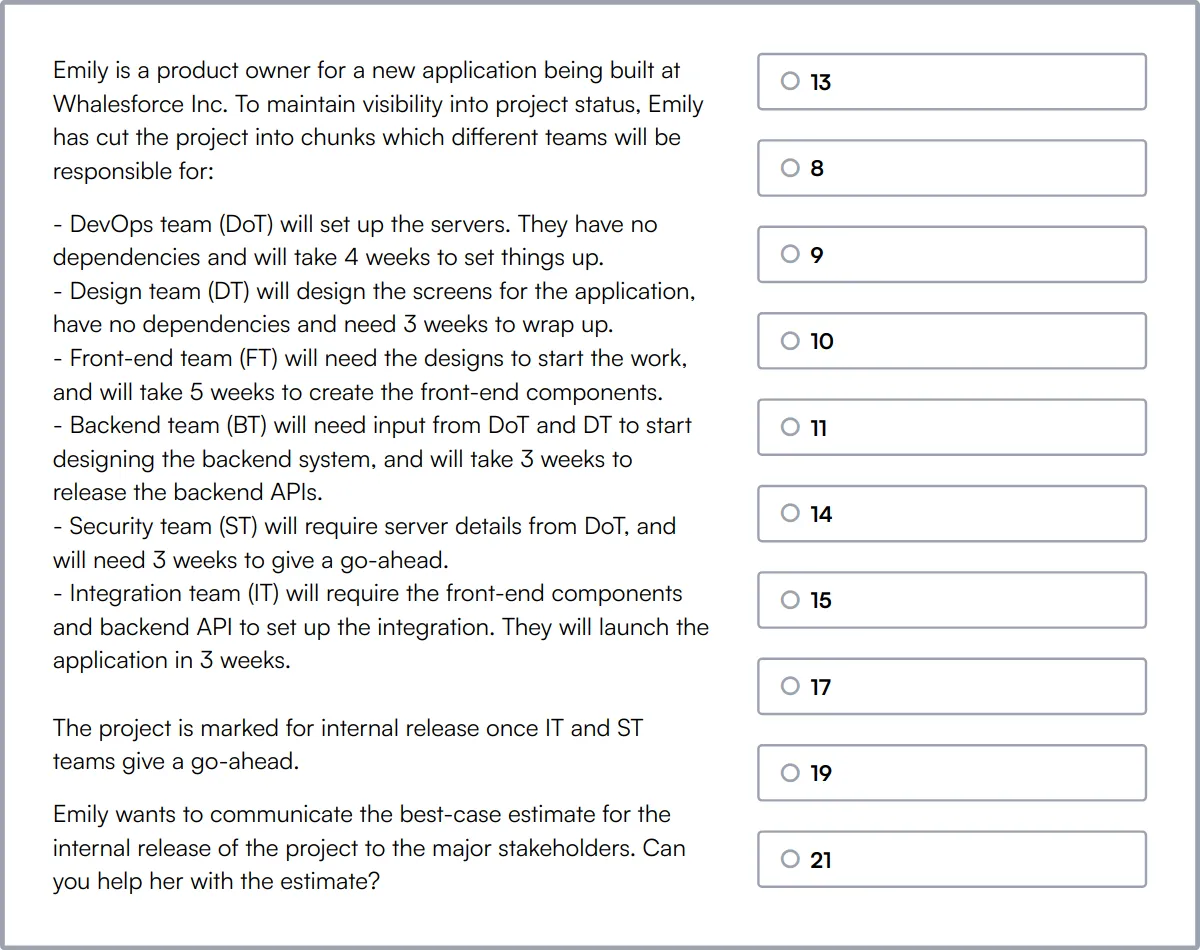
Situational Judgement Test
Our Situational Judgement Test uses scenario-based questions to assess a candidate's ability to handle workplace challenges professionally. It evaluates emotional intelligence, relationship building, awareness, teamwork, and communication skills.
This test measures decision-making and problem-solving abilities through real-life scenarios, assessing how candidates manage work, communicate, and adapt to changes.
Candidates who score well are adept at navigating complex interpersonal situations and making informed decisions that reflect strong ethics and integrity.
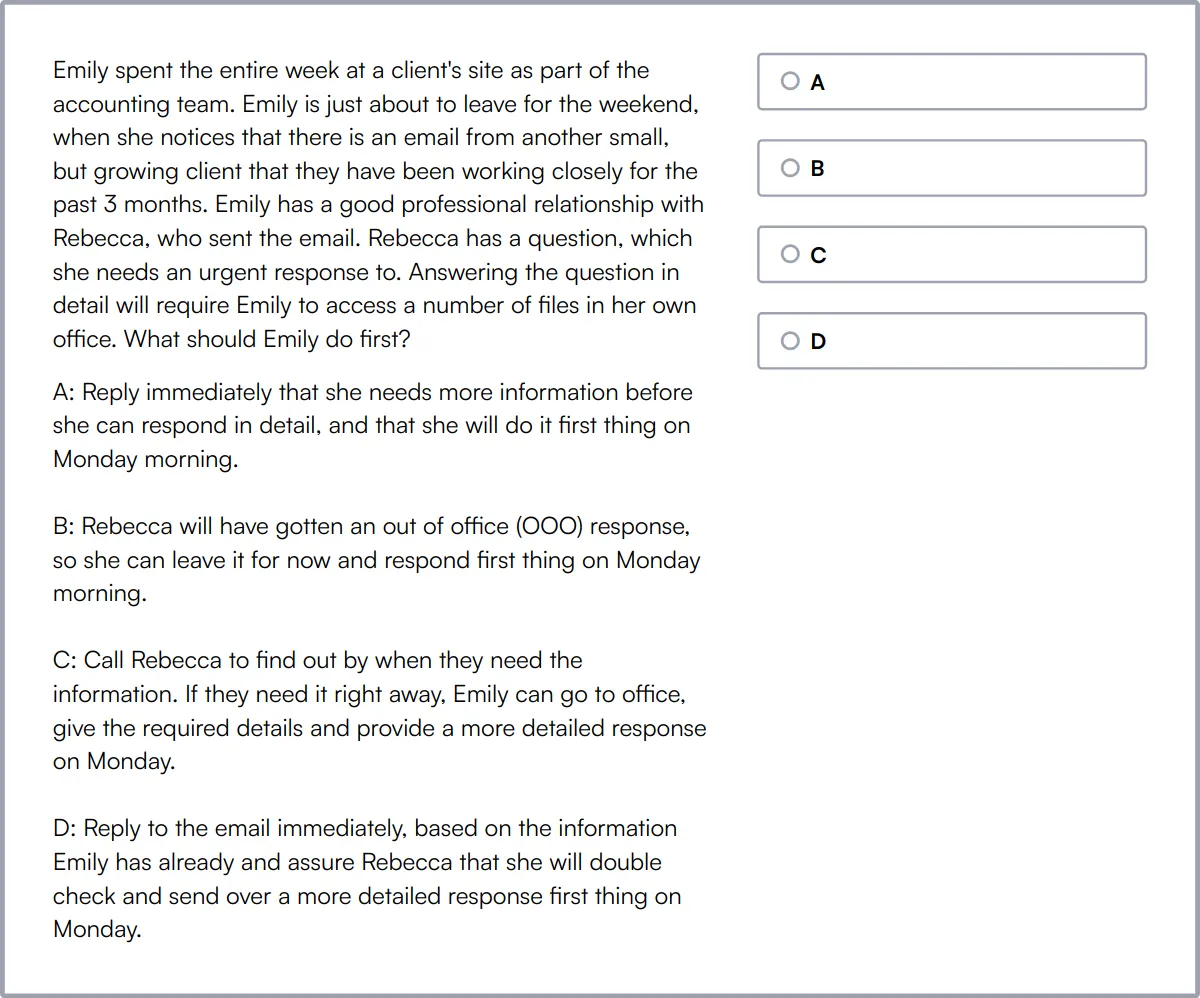
Communication Skills Test
Our Communication Skills Test evaluates candidates' ability to communicate effectively in various professional scenarios. It assesses verbal and written communication, active listening, and interpersonal skills.
The test challenges candidates with questions on verbal reasoning, critical thinking, and situational judgement, focusing on their ability to convey and interpret information accurately and clearly.
High-scoring individuals excel in crafting clear, persuasive communications and can effectively engage with stakeholders at all levels.
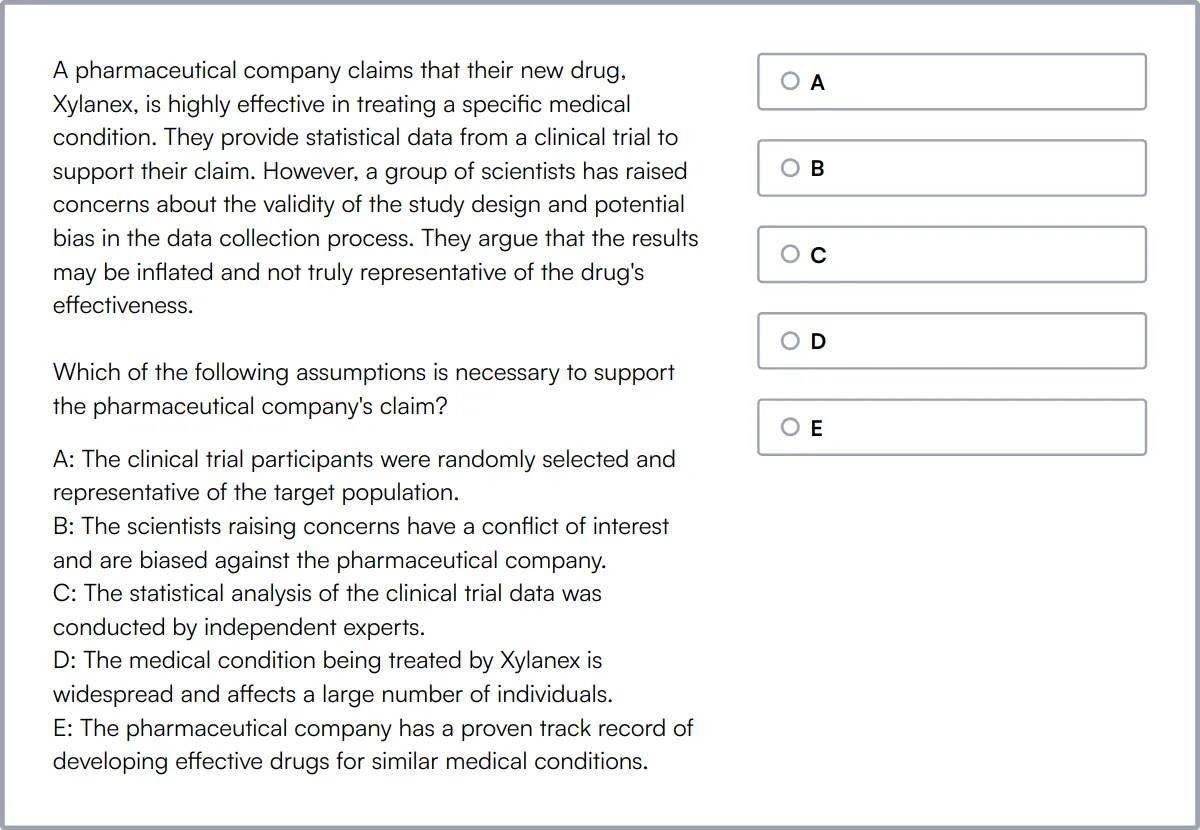
Problem Solving Test
Our Problem Solving Test evaluates a candidate's ability to analyze data and respond to complex problems or situations. It includes questions on logical, spatial, and abstract reasoning.
The test assesses critical thinking and reasoning skills, requiring candidates to apply deductive and inductive reasoning to solve challenging problems.
Candidates who perform well are able to demonstrate a high level of analytical thinking and problem-solving capabilities.
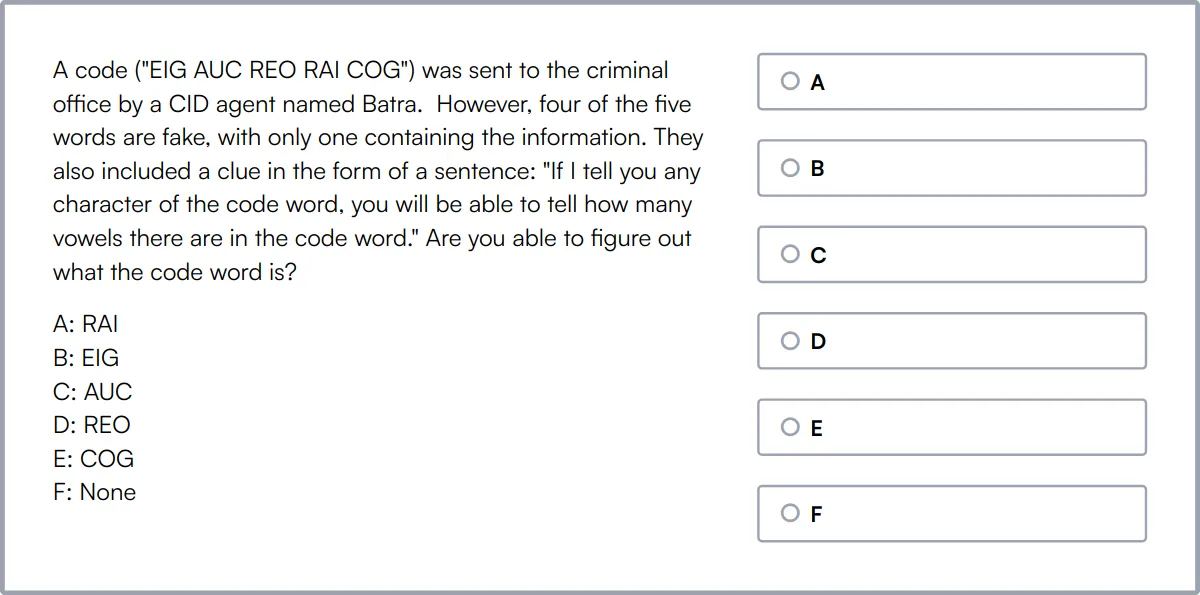
Summary: The 9 key Scrum Master skills and how to test for them
| Scrum Master skill | How to assess them |
|---|---|
| 1. Facilitation | Evaluate ability to guide and manage group discussions effectively. |
| 2. Agile Methodologies | Assess familiarity and practical application of agile practices. |
| 3. Scrum Framework | Check understanding and implementation of Scrum principles. |
| 4. Conflict Resolution | Observe skills in mediating disputes and achieving resolutions. |
| 5. Coaching | Determine capability to train and uplift team performance. |
| 6. Communication | Review effectiveness in conveying information and engaging listeners. |
| 7. Problem Solving | Test ability to identify, analyze, and solve challenges. |
| 8. Servant Leadership | Assess commitment to serving the team's needs first. |
| 9. Time Management | Evaluate efficiency in managing and prioritizing tasks. |
Scrum Master Test
Scrum Master skills FAQs
What are the key skills a Scrum Master should possess?
A Scrum Master should have a strong grasp of Agile methodologies and the Scrum framework, along with skills in facilitation, conflict resolution, coaching, and communication. They should also be adept in problem solving, servant leadership, and time management.
How can you assess a Scrum Master's ability in conflict resolution?
To assess a Scrum Master's conflict resolution skills, consider role-playing scenarios during the interview that involve resolving team disputes or stakeholder disagreements. Observing their approach and solutions can provide insights into their proficiency in handling conflicts.
What is the importance of emotional intelligence in the Scrum Master role?
Emotional intelligence is key for a Scrum Master as it enhances their ability to understand team dynamics, manage personal emotions, and effectively communicate with team members, which is crucial for maintaining a productive team environment.
How does technical knowledge enhance a Scrum Master's effectiveness?
Technical knowledge helps a Scrum Master understand the challenges faced by the development team, communicate more effectively with technical stakeholders, and contribute to technical discussions, thereby facilitating smoother project execution.
What techniques can be used to evaluate a candidate's skills in agile methodologies?
Evaluating a candidate's skills in agile methodologies can be done through specific questions about past projects, challenges faced, and the agile practices implemented. Additionally, practical assessments or certifications in agile practices can be indicative of their expertise.
Why is adaptability important for a Scrum Master?
Adaptability is important for a Scrum Master to effectively respond to changing project requirements, team dynamics, and organizational needs. This flexibility helps in maintaining project momentum and meeting goals despite unforeseen challenges.
How can continuous improvement be fostered by a Scrum Master?
A Scrum Master fosters continuous improvement by encouraging regular retrospectives, promoting a culture of feedback, and implementing lessons learned into future sprints. This helps in refining processes and enhancing team performance over time.
What role does stakeholder management play in a Scrum Master's job?
Stakeholder management is critical as it involves communicating effectively with all parties involved in a project, ensuring their needs are met and expectations are managed. This is key to project success and maintaining alignment between different groups.

40 min skill tests.
No trick questions.
Accurate shortlisting.
We make it easy for you to find the best candidates in your pipeline with a 40 min skills test.
Try for freeRelated posts
Free resources



